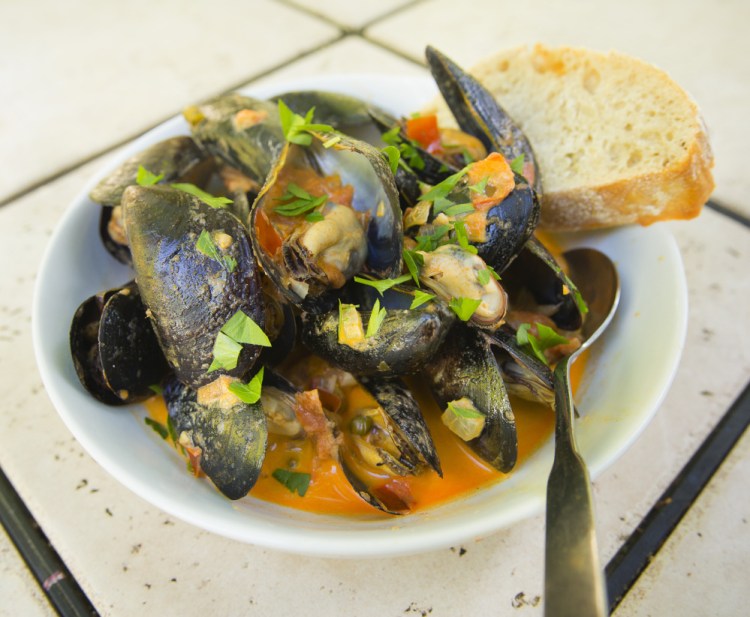Whether you’re heading to a cabin near one of Maine’s forested parks or a cottage at the beach, packing a few essential kitchen items can be the key to making cooking in the rented kitchen a sustainable-eating joy instead of a big waste of time, money and food.
In my case, the green kitchen stuff fits into a couple of reusable shopping bags and a baby beer cooler. If the item won’t come in handy once a day, it stays home.
One sharp, utilitarian knife – in its guard for safe travel – is packed first. A wooden cutting board saves my knife’s edge and doubles as a cheese plate. A peeler, or even a tri-pack of peelers – straight-edge for potatoes and fat asparagus bottoms, julienne-edged for turning summer vegetables into noodle-like sauce carriers or easy slaw side dishes, and serrated to remove the fuzz from peaches and the skins from tomatoes used in quick-cooking seafood dishes like Smokey Mussels with Thyme, Tomato and Cream – get wrapped in a dish towel (never enough of those in a rental!) and tucked in next.
It’s heavy, but a seasoned cast iron skillet works for breakfast, lunch and dinner, so it’s worth its weight. A large baking sheet (17 by 11 inches) facilitates warm peanut butter cookies for that one (hopefully it’s only one) cold, rainy afternoon when everyone is sitting around reading. It doubles as the lid for the cottage’s topless pasta pot and triples as a heat buffer set on the bottom rack if the oven runs hot.
I pack several lidded Mason jars with local grains, flours and sweeteners that I won’t likely find at the quaint, but not well-stocked, corner store near the cabin. The empty jars can be used to emulsify salad dressings, mix vacationland cocktails or house treasures found during long walks on the beach.
My husband tends to buy local beer at any destination, so the cooler he’ll use to transport his finds to subsequent picnic spots is first employed as a condiment carrier. Stacked, half-pint canning jars of olive oil; champagne, balsamic and rice vinegars; soy sauce; mustard; tomato paste; capers; and a few spices travel safely in it. These jars may also contain a few ready-made snacks for the ride .
Two seemingly extraneous items that make it into the bags, room allowing, are my 40-year-old Tupperware popsicle forms and a Bundt pan. The former reduces packaging for kids’ treats but also come in handy when there are leftover adult beverages to be frozen for later. The latter works for blueberry cakes for dessert and breakfast monkey breads and a well-roasted chicken (stand the bird on the tube for crispy skin all the way around). It’s also the perfect vessel to catch the kernels you’re removing from the cob (stick the cob’s end in the tube’s opening and run your knife along it so the kernels fall into the pan, rotate, repeat).
Most of the rentals we’ve hired come kitted out with enough plates, bowls and utensils for at least the four of us. Still, it’s awfully tempting to use paper and plastic – you are on vacation, after all – and washing up is bit of a drag. But unless you’ve sprung for the new, biodegradable plates made from sugarcane, bamboo or other plant starches, these disposables are typically coated with petroleum wax, cannot be composted and are destined for the local landfill.
When washing the dishes in your rental, which could very well be located in an environmentally sensitive spot, use a soap certified to be free of toxins that could harm nearby waterways.
Recycling bins in vacation rentals are commonplace but composting amenities – whether a pile maintained by a facility’s staff or a service included in the rental fee – are just beginning to show up as part of greener summer accommodations.
“Our guests love the compost bucket, especially for lobster shells,” said Stephanie Dunn of portlandmainevacation.com, which offers vacation and long-term accommodations on Munjoy Hill in Portland and provides Garbage-to-Garden composting services to all renters.
I can’t claim to be a completely green eater on vacation (my herbs travel in Ziploc bags; I bring along tin foil for cooking fish, potatoes and leftovers on the grill; and don’t ask me to leave behind good chocolate and French wine), but I can pull off these measures while still leaving myself plenty of time to relax.
Christine Burns Rudalevige is a food writer, a recipe developer and tester, and a cooking teacher in Brunswick. Contact her at: cburn1227@gmail.com.

Cooking essentials from home make the trip with the writer to a rental cabin: Sharp knife, cutting board, vegetable peeler, jars of olive oil and seasonings, even fresh herbs.
Carl D. Walsh/Staff Photographer
Send questions/comments to the editors.


